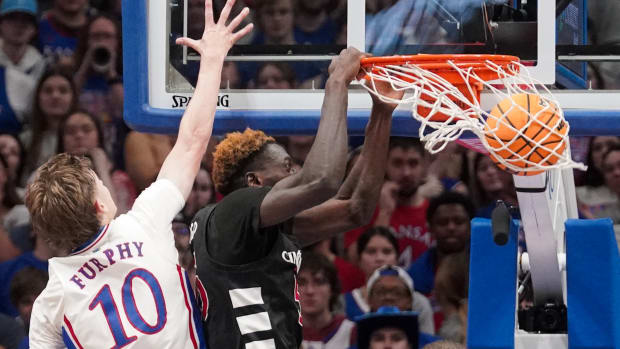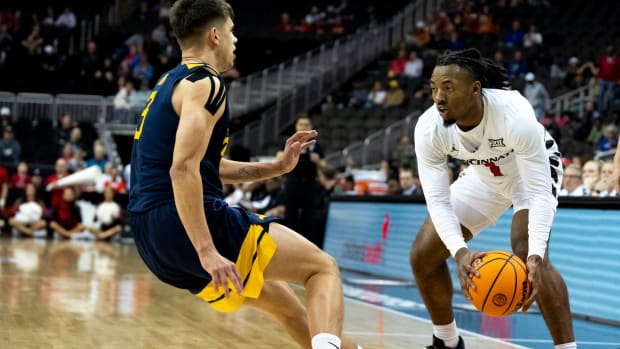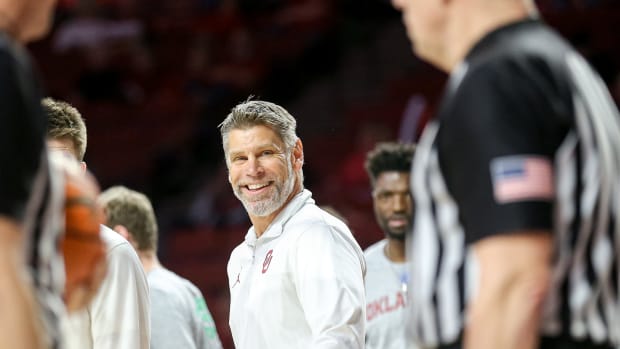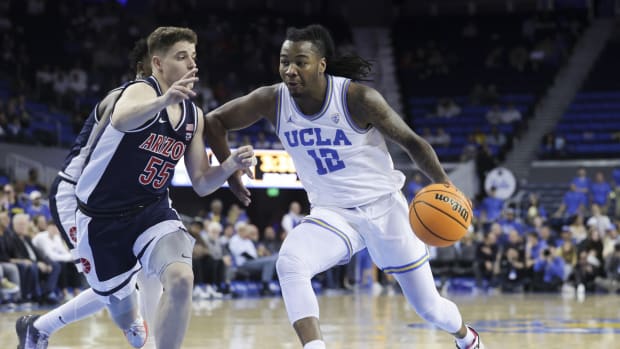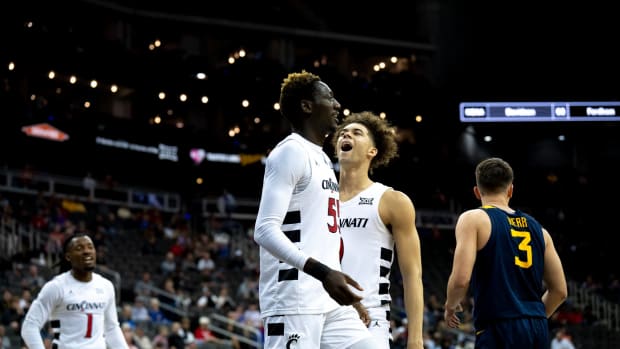No One Wins When the FBI Doubles as the NCAA's Enforcement Arm
In 1988, the clubhouse of the Boston Red Sox, a haven for grumps and churls on the sunniest day that ever dawned upon it, was roiled up because a woman named Margo Adams had filed a $6 million palimony suit against star Boston third baseman Wade Boggs, with whom she’d been keeping company on road trips for the previous several seasons. This caused an uproar unseen in baseball since Jim Bouton published Ball Four, and for many of the same reasons. Ms. Adams was not shy about describing what she’d seen and experienced as a travelling baseball courtesan—what the Irish genius Flann O’Brien would call the “nasty gymnastiness” of baseball players on the road. The entire Red Sox franchise was shaken. Then, there was this curious item in one of the newspaper accounts; it seems that, as a favor to Red Sox management, some local FBI agents had invited Ms. Adams for what was described as “an informal chat.”
Here is one thing I have learned in my years on this planet. There is no such thing as an informal chat with the FBI. What would that entail, anyway? Dusting the hot dogs for fingerprints? Having your Miranda rights read over the punchbowl? If you are a powerful person, you call your friends at the Bureau for one reason and one reason only: to scare the living wits out of somebody out of whom you need to scare the living wits. That said, having the FBI do you this kind favor is beyond the reach of most ordinary citizens. Using the Feebs for your private business requires the kind of juice possessed only by very large and powerful organizations. That the private use of the FBI also is a terrible waste of taxpayer dollars is beyond question.
(And you may recall in later years that the Boston FBI office became an adjunct of Whitey Bulger’s criminal enterprises in and around the city, which did not end well for anyone except Martin Scorsese, who got a decent movie out of it.)
I thought of Ms. Margo this week as things came to a head in what appears to be a thoroughgoing investigation by the FBI into the way that college basketball has filled its rosters since the dawn of time. At first, back in September, when the news first broke, I was marginally intrigued. This wasn’t my first rodeo here and, as Clemenza tells Michael Corleone, “We need one of these every couple of years. Cleans out the bad blood.” I thought—and still do—that the FBI had better things to do than to muck around in who bought whom a meal and who was zoomin’ whom under the table, since very little of what was being alleged seemed to be an actual crime. But then, recently, the leaks started and I saw this whole business take a dark and wasteful turn.
In my reporting experience, anyway, when the leaks begin and bring the scare headlines behind them, it’s a signal that overripe investigators and ambitious prosecutors know either that they have little more than a penny-ante case, or that they have no case at all. So they begin to whisper darkly to favored reporters about secret diaries and conversations overheard on wiretaps. (If you have a major crime caught on a wiretap, you keep it in a vault until you spring it on the hapless defendant.) And, once the leaks are out there, you get headlines like the following on Yahoo Sports, which apparently is the FBI’s vehicle of choice as far as getting this stuff out.
Federal documents detail sweeping potential NCAA violations involving high-profile players, schools
Parse a little bit with me here. Why in the name of Eliot Ness are there “federal documents” generated for the purpose of detailing “sweeping potential NCAA violations”? Isn’t it the NCAA’s job to generate those? After all, it isn’t against the law to break NCAA rules. It gets worse—or more comic, depending on your point of view—if you read more deeply into the story.
While three criminal cases tied to the investigation may take years to play out, the documents viewed by Yahoo revealed the extent of the potential NCAA ramifications from the case. The documents show an underground recruiting operation that could create NCAA rules issues—both current and retroactive—for at least 20 Division I basketball programs and more than 25 players. The documents tie some of the biggest names and programs in the sport to activity that appears to violate the NCAA’s amateurism rules. This could end up casting a pall over the NCAA tournament because of eligibility issues. There’s potential impermissible benefits and preferential treatment for players and families of players at Duke, North Carolina, Texas, Kentucky, Michigan State, USC, Alabama and a host of other schools. The documents link some of the sport’s biggest current stars—Michigan State’s Miles Bridges, Alabama’s Collin Sexton and Duke’s Wendell Carter—to specific potential extra benefits for either the athletes or their family members. The amounts tied to players in the case range from basic meals to tens of thousands of dollars.
Conflating NCAA violations with the kind of crimes the FBI is supposed to pursue is a mug’s game of the first order. It is the kind of maneuver common to floundering prosecutors who want to scare potential witnesses into believing the state’s case is stronger than it actually is. And then there’s this second headline:
Black market diaries: Emails in hoops corruption case detail inner workings of sport's underbelly
Ooooh. “Black market diaries.” Boogedy-boogedy.
Now, there may be some sort of half-arsed tax case, or some petty wire fraud or mail fraud raps, that can be hung on the ASM Sports Agency, the talent-mongers at the heart of this extravaganza, or on the people who already have been arrested and charged. But this was a two-year investigation costing God alone knows how much money and God alone knows how many man-hours to investigate what, precisely? Fraud? Who, precisely, is being defrauded? And what is the nature of the fraud? This isn’t public corruption. This isn’t a kickback scheme to build a bridge, or a state senator who’s gone into the tank for his local developer. This is a well-functioning underground economy that exists only because a regular economy is against the rules. The FBI is operating as the enforcement arm of the NCAA, and that’s just crazy.
Just two years ago, right when the FBI started sniffing around, the NCAA was on the ropes. It was dawning generally that the organization existed to make some people rich on the unpaid labor of other people and that the money had grown so large that the relationship had become grotesque. The NCAA was losing control of the help, both in the courthouse and in the public mind. What was a profitable, if grossly exploitative, organization to do?
Well, now, along comes the FBI and Mark Emmert, who makes $3 million a year but who wouldn’t make a dime without the work put in by teenagers who have to fight to profit even from their own images, stepped up and issued a statement stunningly disingenuous even by NCAA standards, which are very high indeed.
These allegations, if true, point to systematic failures that must be fixed and fixed now if we want college sports in America. Simply put, people who engage in this kind of behavior have no place in college sports. They are an affront to all those who play by the rules.
For the love of heaven, please shut up. There is some talk abroad in the land that the findings of this investigation will lay amateurism to rest once and for all. Read Emmert’s statement again. He sees this as an opportunity to position the NCAA again as the guardians of academic and athletic purity, as a way to break its two-year losing streak and regain control over the help. If you need more evidence that this is Emmert’s long game, consider that the FBI already has said that the universities involved are not objects of the investigation. So, players get named and shamed. Coaches get fired. Agents go broke on legal fees. But Boards of Regents go merrily on, waving their foam fingers in the air and grazing the buffet tables and groaning boards paid for by their “corporate partners.”
But the real clincher was discovered by Shaun King of The Intercept in the filings of a class-action suit brought against the NCAA by one Lawrence “Poppy” Livers, a former college athlete. In response to the suit, the NCAA argued that the status quo is justified by a 1992 decision from the Seventh Circuit court of appeals called Vanskike v. Peters. In that case, Vanskike, who was an inmate in an Illinois prison, argued that he should be paid the federal minimum wage for work he did while inside. The court ruled against him and based its decision on the fact that the 13th Amendment, which outlawed slavery, also has in it a provision allowing involuntary servitude, “as a punishment for crime whereof the party shall have been duly convicted.” This is the reason why we have cheap prison labor to this day. It is also the argument posed in at least three cases now, according to King’s reporting, by the NCAA as a justification for not paying the athletes that keep it in business.
That’s just breathtaking. Emmert gets to puff himself up about “those who play by the rules” while his lawyers equate the athletes who pay his salary with convicts working in prison sweatshops. (There’s a very audible dog whistle in there, too.) From all this I conclude that this FBI investigation, while a colossal waste of time and money, is one of the best things that ever happened to the NCAA and to its status quo, a status quo that remains an affront to common sense and simple justice. And the FBI, god knows, should have better things to do than to gumshoe around trying to figure out who paid for somebody's sandwich.
